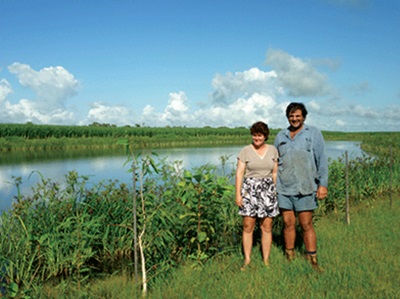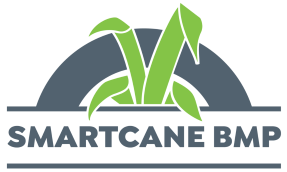Case Study
S-BMP-NSM-2013-001-01
Vince and Rita Papale, who run a family farm just out of Home Hill, have rolled out a number of projects to lift the farm’s productivity, water efficiency and to minimise environmental impact on their land and the nearby Great Barrier Reef.
This project transformed four hectares of poorly-performing low-lands into a highly productive wetland which collects water from the farm’s cane fields, filtering it before it runs back into the river and out to the Great Barrier Reef. From this 98% of water is now recycled back on farm. The wetland teams with birdlife and fish, and had also increased the overall profitability of their farm.
They have nearly finished a project to change row spacing from 1.4 metres to 1.6 to better suit machinery, and have employed the practice of splitting their fertiliser application, one just after harvest and one when the crop is out of hand, to avoid leaching in very wet events.
Set at the heart of the Papale farm in the Burdekin is a wetland which epitomises the family’s approach to farming. Here they have transformed four hectares of poorly-performing low-lands into a highly productive wetland which collects water from the farm’s cane fields, filtering it before it runs back into the river and out to the Great Barrier Reef. With the introduction of the wetlands 98% of water is recycled back on farm.

They say not only has it made a great family picnic spot, teaming with birdlife and fish, but it has also increased the overall productivity of their farm. “What really kick started the project was being hit with really wet years, where the area was swamped and we couldn’t grow cane in that area – and that hurt. After a lot of advice from the local natural resource management group, NQ Dry Tropics, we decided to take out the four hectares of low level country and reconfigured the paddock,” says Vince Papale.
It wasn’t cheap, but with some vital assistance from the Australian Government’s Reef Rescue program, and by investing a lot of their own funds, the project has reaped its own rewards. “Today we produce the same amount of cane on less area and it is more reliable,” he says. The couple is also well-known for using their farm to help educate others about the importance of best management practice farming and its ties to sustainable and productive farming. Local school groups and the local council have come in to test the water. The results of water samples collected from the wetlands showed the diversity of invertebrates present – the wetlands water sample was literally teaming with life.
By working on this diversification project, Vince and Rita have achieved an outcome that means their farm has increased profitability and its environmental credentials – a win for everyone.
See the 7:30 report on the Papale’s wetland here
